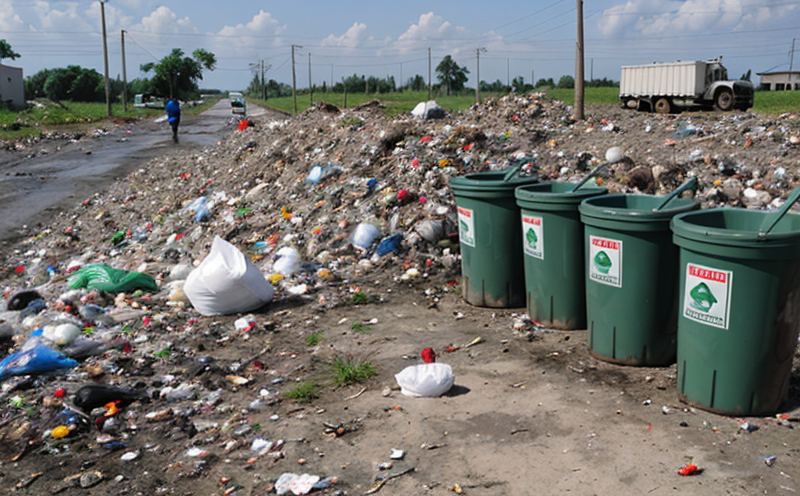ISO 21268-1 Batch Leaching Test for Solid Waste Test
The ISO 21268-1 batch leaching test is a critical procedure used to assess the potential environmental impact of solid waste materials. This test measures the amount of hazardous substances that could be released into the environment from waste under controlled conditions, which helps in determining compliance with regulatory standards and ensuring the safe handling and disposal of solid waste.
Compliance with ISO 21268-1 is essential for industries dealing with municipal solid waste (MSW), construction and demolition debris, hazardous waste, and other types of waste. This test evaluates whether the leachate from solid waste contains pollutants that could harm human health or the environment. The test simulates real-world conditions where landfill leachates interact with soil, water bodies, and groundwater.
For example, in the case of municipal solid waste, understanding the potential for hazardous substances to leach into the environment is crucial for effective waste management strategies. In construction and demolition debris, this test helps identify which materials are safe for recycling or need special handling due to their toxic content. For hazardous waste, it ensures that proper disposal methods prevent contamination of landfills and groundwater.
The ISO 21268-1 batch leaching test is typically performed on a representative sample of the solid waste material, following strict protocols outlined in the standard. The test involves placing the solid waste in a controlled environment where it simulates conditions found in landfill sites or other disposal facilities. Over time, water is introduced to the waste, and the leachate produced is collected for analysis.
The analysis focuses on several key parameters including pH levels, heavy metals (such as lead, cadmium, mercury), organic compounds, and other potentially harmful substances. The test results provide valuable insights into the environmental risk associated with specific types of solid waste materials. This information is essential for regulatory compliance, R&D projects aimed at reducing environmental impact, and informed decision-making in procurement processes.
The ISO 21268-1 batch leaching test not only helps in assessing risks but also aids in developing more sustainable waste management practices. By identifying which components of the waste are most likely to cause harm, this test supports the implementation of targeted mitigation strategies. For instance, it can guide recycling efforts by separating out hazardous materials that should be handled separately from those that can safely go into secondary use.
Moreover, compliance with ISO 21268-1 is often a requirement for waste management companies and facilities handling large volumes of solid waste. It ensures they meet stringent environmental regulations set forth by local authorities and international bodies like the United Nations Environment Programme (UNEP). This standardization promotes best practices in waste management globally.
In summary, the ISO 21268-1 batch leaching test is a vital tool for ensuring that solid waste materials are managed responsibly. It provides crucial data needed to protect both human health and ecosystems from potential harm caused by improperly managed waste streams.
Applied Standards
| Standard Number | Description |
|---|---|
| ISO 21268-1:2017 | Batch leaching test for solid waste – Part 1: General principles and procedures. |
| ASTM D5338-94(2017) | Standard test methods for leaching of solid waste landfill samples into water using the batch percolation technique. |
| EN 12457:2016 | Determination of leachate from landfilled municipal and industrial wastes – Batch leaching test. |
| Parameter | Description |
|---|---|
| pH Levels | The range of pH values that indicate the acidity or basicity of the leachate, critical for assessing corrosivity. |
| Total Dissolved Solids (TDS) | Measurements of all dissolved substances in the leachate to gauge overall concentration. |
| Heavy Metals (Lead, Cadmium, Mercury) | Quantification of toxic metals present in trace amounts that can pose significant risks if released into the environment. |
| Organic Compounds | Detection and quantification of organic compounds such as volatile organic compounds (VOCs) and polychlorinated biphenyls (PCBs). |
Eurolab Advantages
At Eurolab, we offer comprehensive ISO 21268-1 batch leaching tests tailored to meet the unique needs of our clients. Our state-of-the-art facilities equipped with advanced analytical instruments ensure precision and reliability in every test performed.
We provide a wide range of services including sample preparation, testing according to international standards, data analysis, and reporting. Our highly experienced team comprises experts who are well-versed not only in the technical aspects but also in regulatory compliance requirements.
Our commitment to quality is reflected in our ISO 17025 accreditation, which guarantees that all tests conducted meet the highest industry standards. We also offer flexible turnaround times and transparent communication throughout the testing process, ensuring that our clients receive timely and accurate results.
In addition, Eurolab supports sustainability initiatives by helping organizations comply with environmental regulations while minimizing their ecological footprint. By leveraging our expertise in this area, businesses can make informed decisions regarding waste management practices that are both cost-effective and environmentally responsible.
Our network of laboratories across Europe allows us to serve clients from diverse geographical locations efficiently. Whether you require testing for municipal solid waste, construction debris, or hazardous materials, Eurolab is equipped with the necessary expertise and resources to deliver accurate and reliable results.
Why Choose This Test
The ISO 21268-1 batch leaching test offers numerous advantages for various stakeholders involved in solid waste management. Here are some key reasons why choosing this method is beneficial:
Regulatory Compliance: Meeting stringent environmental regulations imposed by governments worldwide, such as those set out in EU directives and national laws.
Risk Assessment: Identifying potential risks associated with specific types of solid waste materials before they are disposed of or recycled.
Decision Making: Providing valuable information to guide decisions related to waste management practices, recycling programs, and landfill operations.
Sustainability: Supporting efforts towards more sustainable waste disposal methods by minimizing environmental impacts.
R&D Support: Assisting in the development of innovative solutions that reduce the risks posed by solid waste materials.
Client Satisfaction: Ensuring accurate and reliable results through our state-of-the-art facilities and experienced personnel, leading to enhanced client satisfaction.





